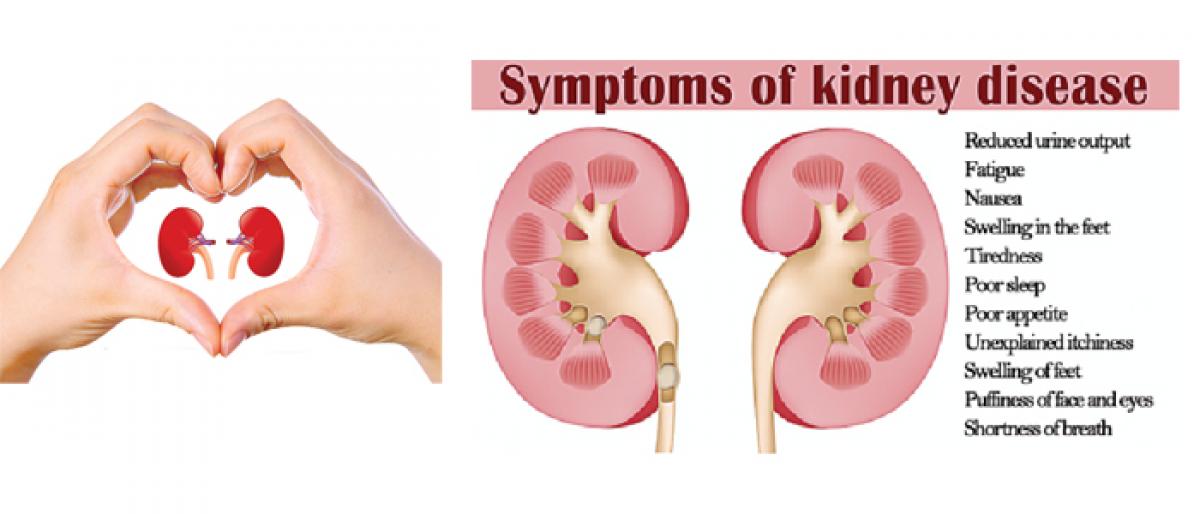Live
- Campaign ends for first phase of LS polls in Assam
- New features in TNEB Online payment: What has changed?
- BSE vs. NSE: Unveiling Key Differences and How They Impact Investors
- Financial Fluency, The Power of Punctual Tax Payments
- Dubai Food Festival kicks off This Week with Exciting Lineup of Gastronomic Events and Experiences for its Eleventh Edition
- KeyPoint Technologies Achieves Milestone with Indian Patent Office Approval for Contextual Discovery Innovation
- Unacademy Hosts Udaan in Vizag To Empower Thousands of IIT JEE and NEET UG Aspirants
- Chandrababu Naidu, Pawan Kalyan confident of 'Rama Rajyam' in Andhra
- Global Team Toyota Athletes from Asia Set to Reach for Greater Heights at Paris 2024
- Samsung Announces New Era of AI TVs in India, Launches Neo QLED 8K, Neo QLED 4K and OLED TVs with Powerful AI Features
Just In

Kidneys are a pair of organs located in the small of the back, one on either side of the spine
Kidneys are a pair of organs located in the small of the back, one on either side of the spine.
They are responsible for filtering and removing waste products from the body, keeping bones healthy and looking after blood pressure.
As we age we are at increasing risk of our kidneys working less well, but they may also work less well as a result of certain medical conditions such as diabetes or high blood pressure.
Kidneys are mainly involved in removing waste products from the body; preventing toxins from building up in the bloodstream.
Kidneys produce hormones that take control of the functions of other parts of the body, for instance regulating blood pressure and producing red blood cells.
And also regulate the level of minerals and fluid in the body.
Renal Diseases
Post the circulation of blood through the entire body, it then passes onto the kidneys.
Here, kidneys filter waste products from the blood including extra salt and water and these are then passed out as urine.
So, imagine your kidneys getting into a non-functional mode. If this ever happens the waste product build-up is likely to cause some chemical imbalance which is otherwise required for the smooth functioning of the body.
Such disorders among others are precisely termed as renal diseases.
There are different kinds of renal diseases, some even leading to End Stage Renal Disease (ESRD).
ESRD is a condition in which the kidneys fail to work in a normal way with the patient needing dialysis or a kidney transplant.
Causes
So, what exactly causes these 2-little fist-sized organs to suddenly go out of order? Kidney diseases are mostly caused due to diabetes, high blood pressure, and hardening of the arteries.
However, some of these diseases can also occur due to the inflammation of the kidneys. This condition is called nephritis.
Some anatomic disorders too can lead to renal diseases besides the one resulting from metabolic disorders.
The chances of the latter happening, however, are thin for in the case of metabolic kidney disorders are rare since they need to be inherited from both parents.
The other causes may as well include blockage of the system that drains the kidneys or the medications that are toxic to the kidney tissue.
Symptoms
Since the causes can vary, so can the symptoms. Some very common symptoms, however, are too much or too little urine or passing blood or abnormal levels of chemicals in urine.
But if the disease is caused by a bacterial infection, the first sign is a high fever. In the case of moderate or mild kidney diseases, there are sometimes no symptoms at all.
Kidney stones in the ureter are seen to cause some cramping pain that spreads from the lower back into the groin.
The disease can lead to chronic or acute kidney failure. While the failure of kidneys in the former happens gradually, the latter may happen within a few hours or days. Both are life-threatening.
The real problem, however, lies in the diagnosis of the disease because unless there’s a tumour or the kidneys are swollen, it becomes difficult for the doctors to check by simply feeling the kidneys.
There are however tests that check the kidney tissues, take urine samples and checks for protein, sugar, blood, and ketones etc.
Treatment
When treating kidney, the doctors tend to concentrate more on the underlying cause of the disease. The infections can also be cured by antibiotics if the infection is caused by bacteria.
In the case of acute kidney failure, this scheme works best. In such cases treating the original cause can help return the kidney to its normal functioning.
But in most kidney failure cases, the blood pressure has first to be brought to be normal in order to evade any more progression of the disease.
End-stage kidney failures are only controlled by dialysis or kidney transplant. Dialysis can be done once a week or more often depending on the condition.
In case of transplant, the diseased ones are replaced by a new or a healthy one. These transplants are said to work 80 percent of the time.
The only fear in this case what if the body rejects the transplant. The risk, however, is worth it because a healthy kidney can help you live a better life.
(The writer is a HOD – Centre for Kidney Transplant and Renal Sciences, Saroj Super Speciality Hospital, Delhi)

© 2024 Hyderabad Media House Limited/The Hans India. All rights reserved. Powered by hocalwire.com







